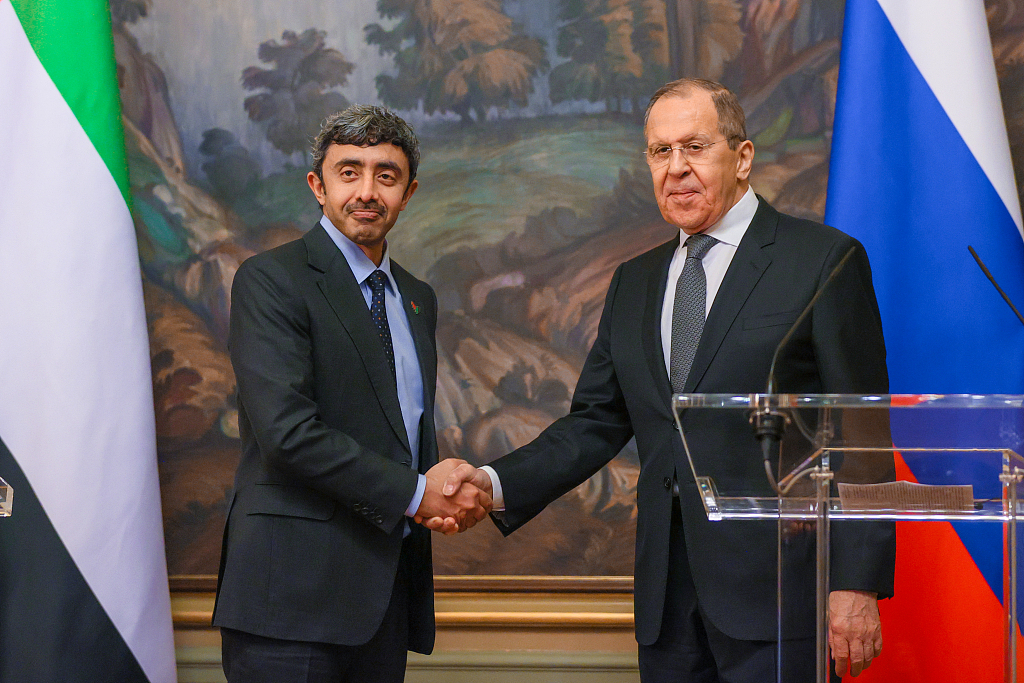
Oil prices soar as Russia-Ukraine tensions rise in Virginia, the U.S., February 25, 2022. /CFP
Oil prices soar as Russia-Ukraine tensions rise in Virginia, the U.S., February 25, 2022. /CFP
Editor's note: Guy Burton is an adjunct professor at Vesalius College, Brussels. The article reflects the author's opinions and not necessarily those of CGTN.
Are some Middle Eastern countries starting to abandon hedging as a foreign policy strategy in favor of more transactional behavior? If so, then this could mark a departure and poses questions about the future of the region's international relations.
Hedging is an approach that involves diversifying relations and spreading risks while avoiding difficult relations with any side. It is an approach that is built with an eye to the future.
By contrast, a transactional foreign policy is more immediate and functional in scope. It is more concerned with generating mutually beneficial outcomes right now.
Among the governments that seem to be doing this are those that have historically been close to the United States. Countries like Israel, Saudi Arabia, the United Arab Emirates (UAE) and Turkey have all taken paths that deviate from Washington's. Moreover, they all seem to be taking a similar path at the same time.
What makes these countries' current behavior notable is that it is happening against the wider backdrop of the Russian-Ukrainian conflict. Regional governments are being asked to pick a side by their American ally and partner, and the results have not gone according to Washington's wishes.
While Western countries have been drawing up sanctions against Russian banks and individuals, all four Middle Eastern countries have avoided doing the same. Saudi Arabia has so far ignored U.S. President Joe Biden's request to increase oil production and bring down oil prices.
Meanwhile, further afield, the UAE's leaders recently hosted Syria's President Bashar al-Assad – despite longstanding Western opposition to the government and tougher U.S.-imposed sanctions in the form of the Caesar Act two years ago.
In each instance, the reasons for America's partners have been highly pragmatic and out of self-interest. Israel and Turkey, for instance, have interests in Syria, and although they diverge from Russia's backing for Bashar al-Assad, they benefit from coordinating their actions with each other.
Meanwhile, Saudi Arabia and the UAE both have had steadily growing business ties with Russia in recent years. In addition, both countries are part of the OPEC+ group of oil producers that includes Russia and which seeks to keep oil prices high to generate more revenue for their economic diversification strategies.
Some observers have suggested that these countries accommodate Russia at the expense of what their American ally demonstrates the degree to which the region – and global politics – has changed. The unipolar American moment has ended, and the Middle East, like the rest of the world, is entering into a more multipolar age, where the U.S. is one among several important powers.

Russian Foreign Minister Sergey Lavrov (R) and Minister of Foreign Affairs and International Cooperation of the United Arab Emirates Abdullah bin Zayed Al Nahyan hold a joint press conference after their meeting in Moscow, Russia, March 17, 2022. /CFP
Russian Foreign Minister Sergey Lavrov (R) and Minister of Foreign Affairs and International Cooperation of the United Arab Emirates Abdullah bin Zayed Al Nahyan hold a joint press conference after their meeting in Moscow, Russia, March 17, 2022. /CFP
Skepticism of the U.S.' intentions has also coincided with several of these governments becoming more active in their foreign policies as well. That behavior was partly prompted by the fear of the instability generated by the uprisings in the Arab world after 2011 and the breakdown it generated both in states and societies from Syria, Libya and Yemen to Iraq, Sudan and Lebanon.
Against that view is another, currently untested one. What happens if the assumptions are wrong? What if the U.S. ceases to behave as a disinterested or weak power and instead pulls rank? If so, then it may be that much of these countries' current behavior might change.
Certainly, there is scope for that to happen. While it is certainly the case that the U.S. is no longer the sole global power and there are plenty who question the basis of the current Western-dominated liberal order, it is still the case that the U.S. has substantial resources and capacity.
At the same time, should the U.S. decide to apply pressure on its Middle East partners, that could also have important consequences for its partners, itself and the region.
For one, were the U.S. to draw lines and demand that regional governments decide where they stand, it could help American interests in the short term by ensuring that they aligned with Washington's objectives in both regional and global affairs.
However, forcing governments to choose sides could create problems for the U.S. as well. While it would ensure a common front for Washington, it could prompt leaders in the Middle East to question the extent to which their relationship with the U.S. is a "partnership." That could lead to a long-term weakening of trust in each other.
American pressure on its regional allies could also have wider implications for regional international relations. It could bring an end to the emerging mode of transactional foreign policy behavior we have been seeing. But it may also mean an end to hedging as an option since it usually happens under conditions of uncertainty and the presence of multiple and competing poles.
In sum, a more muscular American approach could have long-term implications for the region. It could limit foreign policy options for its partners, which given their growing autonomy in recent years, could result in growing ill will towards Washington.
In addition, looking further ahead, this could be especially problematic for the U.S. if its current global and regional advantage is eroded and ceases to be relative. Should that happen, then the character of the Middle East's international system could undergo further transformation in which other powers may become more prominent and in which forms of interaction between them and regional states may be substantially different than they are now.
(If you want to contribute and have specific expertise, please contact us at opinions@cgtn.com. Follow @thouse_opinions on Twitter to discover the latest commentaries in the CGTN Opinion Section.)

